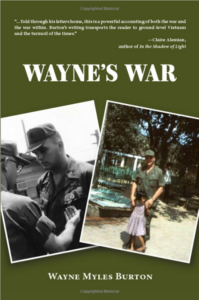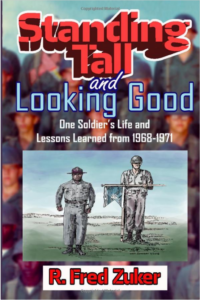 The Lessons Of Remembrance: A Book Review
The Lessons Of Remembrance: A Book Review
Dr. Sam Grogg
Interim Registrar, Bennett College (Greensboro, North Carolina)
WAYNE’S WAR by Wayne Myles Burton, 2019, 113 pages.
STANDING TALL AND LOOKING GOOD by R. Fred Zuker, 2018, Kindle edition, 300 pages.
For us “Boomers,” our coming of age time-frame embraced dramatic social change over racial and gender equality, our country was divided over a faraway military conflict and technology had evolved to take a shot at the moon. The lessons we learned as we moved through the 60’s and 70’s seem so on the mark in preparing us for what was to come over the ensuing fifty years.
Two recent books penned by men who have dedicated their adult life to higher education remember the lessons they learned during their military service in that era. Their remembrances will resonate with all who passed through the years of Vietnam.
WAYNE’S WAR by Wayne Burton opens with an emotionally charged prologue recounting a trip by Wayne to the Vietnam Veterans Memorial Wall in 1999. “As I walked among the memorials heading for mine, I couldn’t help but notice that the wars we win get columns of names and music played by dancing fountains,” he writes. “For wars we lose, we get a diagonal trench symbolic of our uneasiness and the unresolved conflict with regard to the Vietnam War’s meaning (pp. 1-2).”

Wayne finds the name of one of the fallen, Robert Boyd, a high school classmate and Army buddy, and places one of his three Bronze Stars at the base of the wall in tribute. Then he sits and weeps.
Burton describes his entry into the military by joining the ROTC in college: “I signed up to get the $40/month stipend to fund my social life and to get academic credit and help keep my flagging GPA above water.” A few years later, in the summer of 1968, he left the “World” and arrived in Vietnam.
Wayne was stationed in the Mekong Delta region of Vietnam at Dong Tam, the base camp for the 9th Infantry Division as a Captain Adjutant of the 9th Signal Battalion dealing with personnel, legal, awards and decorations, and other matters. “I was also assigned as the Headquarters Company Commander responsible for troops working in and around our headquarters for insuring that the dozen or so defensive positions were manned 24 hours a day, seven days a week (pp. 11-12).”
Life at Dong Tam was preoccupied with keeping alive. Wayne describes his introduction to his new home: “That first assault, on my first day in Dong Tam, began at 4:30 a.m. and lasted over an hour.” Over the course of his tour, Wayne, experienced about 200 attacks, mortars, snipers, and a ground probe of the enemy trying to breach the perimeter of the camp.
Wayne’s account of the years in Vietnam rely heavily on the daily letters he wrote to his wife, Betsy. He struggles with how much he should tell of his experience in the missives to not worry is new spouse. The letters are quoted often and convey a “real time” sense of day to day life on the job in Dong Tam.
In one of the letters he tells Betsy about an orphanage about five miles from base camp at My Tho. His company “adopted” the orphanage and risks attacks on a weekly drive to visit and drop off supplies. He describes one of the orphans, a little girl named Ho who “. . . latched on to my little finger and dragged me around, showing me all the scenic wonders. She was real cute but a strong-willed little girl (p. 60).” Later, when remembering the days his unit was recalled and he left Vietnam, Wayne is haunted by the image of Ho. “I see her standing by the gate the Sunday after we left. I wonder how long she watched the street we normally came down before realizing we were never coming back (p.99).”
STANDING TALL AND LOOKING GOOD takes its title from a cadence chant that the author shouted as he marched his platoon to and from training exercises.
Fred Zuker enlisted in the Army in the summer of 1968 hoping to have some choice in his training paths that conscription did not offer. His account is no nonsense, literal and as detailed as memory serves. And it is with personal purpose that he tells his story. “I have come to the realization that I need to systematically recall my service in the US Army—not only because it was war time and especially intense for almost everyone in America, but also because it taught me so much about myself.”
Zuker provides a well-researched overview of the background to the Vietnam build up, the draft and the social climate of the times. The Vietnam War (actually a “conflict” and never officially declared a war) for many subsequent generations is a murky historical event.
 As both of these books acknowledge, this was a war that Americans seem more likely to forget than remember. Zuker’s succinct opening chapters are valuable in grounding all of recollections or lack thereof regarding the times and circumstances.
As both of these books acknowledge, this was a war that Americans seem more likely to forget than remember. Zuker’s succinct opening chapters are valuable in grounding all of recollections or lack thereof regarding the times and circumstances.
A college football player at Duke University, Fred was 6’3” tall weighing 240 lbs. when he arrived at Fort Campbell, Kentucky for basic training. Field First Sergeant Collins: “’Zuker, I’m going to be on your ass for the next eight weeks.’”
STANDING TALL AND LOOKING GOOD recounts the basic training experience in detail. A week by week account, we follow Fred and his fellow troopers as they march, run, exercise, run, learn their M-14’s, run, practice hand to hand combat and run some more. Fred quickly moves from being Sergeant Collins’ target to his first assistant in leading the company through basic training.
Fred reflects, “Over the course of a lifetime, these eight weeks would hardly count as a footnote in temporal terms alone. However, what happened to us had a much more profound effect that any of us might have anticipated. . . . Life doesn’t give us too many of that type of learning experience, which is probably as it should be. I’m glad that I, and most of my basic training brothers of E-2-1, came through intact (loc. 3653).”
Zuker comes to marvel at the planning and logistics that the military relied upon to move thousands of men through training and to prepare them for far flung assignments across the globe. It just made sense to him that this particularly American combination of imagination and common sense would make the Moon Landing a reality that he watched during his time at Ft. Bragg. “This event was a sharp counterpoint to all the negativity associated with the war in Vietnam. . . . It was a welcome respite and a timely reminder that the United States could create remarkably good things for the world and not just a military misadventure (loc. 3951).”
Both of the authors spend time with the issue of race in the military and the times. Fred was born up north, but grew up in the south and remembers the Jim Crow laws and the clear separation of the races. “I remember vividly a Ku Klux Klan march that took place in downtown Durham, North Carolina, during my undergraduate years at Duke (loc. 2844).” Wayne grew up in the Boston area in “a nearly all white suburb.” He writes, “My parents were not racist in the angry, hating sense. But they were biased, both products of Yankee forebears, who skirted the race issue when it was raised in our household (p. 26).”
In the military, the racial tensions did not disappear and in, many cases, the accounts offered by Zuker and Burton offer examples of escalated prejudice and injustice. But both learn from their close interdependence on their fellow soldiers regardless of race or ethnicity.
“My experience in the Army, especially basic training, demonstrated to me that the goal of working together as a team with individuals from different backgrounds is achievable with leadership that empowers and elevates the entire group (loc. 2860),” says Zuker.
Wayne Burton devoted much of his career after the Army as a legislator and educator to social justice and diversity. “That we asked black enlistees to risk their lives for a country that, on their return, would limit their access to the pools, offer limited educational opportunities, and consign them to separate facilities makes understandable the anger of so many (p. 36).”
Looking back, both of the authors know that their time in the military contributed to their leadership style and effectiveness in higher education. “Perhaps this experience contributed to the leadership philosophy I often articulated to my staff when in leadership positions in higher education. I suggested it was the role of leaders to create an environment in which organization members felt respected and valued (p. 85),” writes Burton.
An incident where Fred emulated the harsh actions of one of his drill Sergeants with a fellow trooper gave him insight for a lifetime. “As I turned to join the company it struck me that my nature was incompatible with the authoritarian, brutal tactics of the drill sergeants. I was not a drill sergeant. I was one of the men, and my leadership was only going to work if they respected me because I was working with them, not beating them down (loc. 2734).”
As they close the military chapter in their lives, Burton and Zuker offer conclusions that echo results of a shared experience. Wayne writes, “I and my generation had to learn the hard way. My generation’s claims to greatness rely on the next generation learning from, and not repeating, the mistakes of the past. Otherwise I feel what I and my generation endured will have truly been in vain (p.108).” Fred takes away the lesson that no matter how difficult a situation may be, it can always be improved. “That is our greatest challenge, to face the unavoidable downfalls of life, but—time after time—request permission to recover and go on to the next hill, to give it our best shot (loc. 5247).”
Fred and Wayne both went on from their military days to become higher education leaders and members of The Registry. Each have had hundreds of colleagues and thousands of students who have known them as educators in one form or another. But they share a shadow identity that has made all the difference to their individual lives. They tell personal stories of uncertain times and circumstances and the lessons that were learned along the way: Lessons that can be of great comfort in our current uncertain circumstances. All thanks to Wayne Burton and Fred Zuker for sharing their memories. It is a privilege to have read these two books.
Sam Grogg is a member of The Registry currently on assignment as Interim Registrar at Bennett College, he is former Provost and Dean of Arts and Sciences at Adelphi University in New York and now resides in Winston-Salem North Carolina
HIRE AN INTERIM
Searching for an Interim?
Please contact us for more information.

